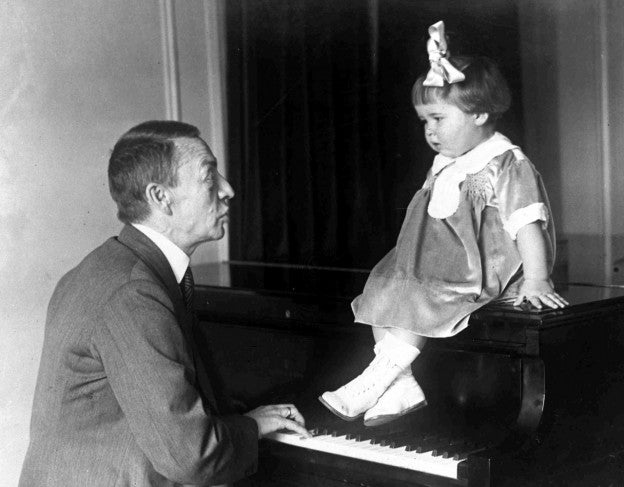
What Rachmaninoff Taught Pianists in 1910—and Why It Still Matters
Share
In March 1910, The Etude magazine published a rare and illuminating interview with Sergei Rachmaninoff—composer, virtuoso pianist, and one of the towering musical minds of the 20th century. Rather than a biographical sketch or promotional piece, the article offered something far more enduring: ten pieces of advice for pianists, drawn from Rachmaninoff's own philosophy of artistry.
More than a century later, these insights remain astonishingly relevant—not just for pianists, but for anyone striving to play music with authenticity, imagination, and depth. Below is a distillation of his ten key points, along with reflections on what they mean for today’s musicians.
1. Start with the Big Picture
“Form the proper conception of a piece before playing it.”
Rachmaninoff urged pianists to internalize a composition’s entire architecture before focusing on details. This means understanding its emotional arc, formal structure, and character—not just learning notes. Whether by listening to great interpretations or studying the score holistically, forming a mental image of the piece is essential. It's like navigating a forest with a map, rather than getting lost among the trees.
Don’t just practice bars and phrases—cultivate a vision of the whole.
2. Technique Is a Tool, Not a Trophy
“One must acquire a thorough and fluent technique.”
He recommends foundational exercises (Hanon, Czerny, Henselt), but always in service of expressive freedom. Virtuosity, for Rachmaninoff, was never about speed or flash—it was about making the piano speak. A flexible, clean technique allows music to breathe.
Technique is the grammar of musical storytelling. Use it to say something.
3. Phrasing Is Breathing
“Play phrases, not notes.”
Don’t rely solely on printed slurs to guide musical phrasing. Instead, listen inwardly. Just as a sentence gains meaning through inflection, music requires natural rises and falls. Good phrasing is what gives a performance human shape.
Cultivate musical instinct. Let your phrases breathe like spoken language.
4. Be the Master of Your Tempo
“Use the metronome as a guide, not a dictator.”
Mechanical timing is the enemy of musical vitality. While Rachmaninoff valued rhythmic discipline, he warned against metronomic rigidity. The finest performances are alive with subtle rubato, elasticity, and timing shaped by emotion.
Internalize tempo with freedom. Feel time, don’t just keep it.
5. Every Piece Has a Soul
“Bring out the character of each composition.”
One-size-fits-all playing dilutes a composer’s voice. A Mozart sonata isn’t a Scriabin prelude—and shouldn’t sound like one. True musicianship lies in channeling the unique emotional DNA of each piece with clarity and imagination.
Be a chameleon. Adapt your sound to the music’s personality.
6. The Pedal Is the Piano’s Soul
“The pedal must be studied deeply.”
Rachmaninoff called the pedal the soul of the piano—an extension of one’s expressive palette. He referenced Anton Rubinstein’s legendary pedaling, where nuance and resonance shaped the entire soundscape. It's not about blurring or sustaining, but coloring and sculpting.
Pedal with purpose. It's an art form, not an afterthought.
see our Pedal Bookmark ↗
7. Escape the Trap of Convention
“Avoid imitation and routine.”
Rachmaninoff warned against becoming a mimic of trends or teachers. Artistry begins where imitation ends. Find your own voice. Cultivate conviction in interpretation and break away from the "default" way of playing.
Study the masters—but don’t become them. Honor your musical instincts.
8. Go Beyond the Backstory
“Seek unity and expressive force, not just programmatic meaning.”
He cautioned against reducing a piece to its anecdotal or descriptive content. While knowing a composition’s inspiration can be helpful, it shouldn’t replace a deeper understanding of its structure, emotion, and narrative logic.
Storytelling in music comes from the music itself, not just the footnotes.
9. Educate, Don’t Just Entertain
“Playing should cultivate the taste of the public.”
Performers have a responsibility to uplift audiences—not just give them what’s easy or expected. Challenge them with meaningful repertoire and thoughtful interpretations. Rachmaninoff saw the performer as an ambassador of the art form.
Don’t underestimate your audience. Invite them into deeper listening.
10. That Indefinable Spark
“Put the flame of inspiration into your work.”
No lesson, exercise, or theory can substitute for what Rachmaninoff calls the "vital spark"—the deep artistic fire that animates a performance from within. It's what separates a technically perfect reading from a transformative one. The pianist must feel, live, and believe in every note.
Music needs heart. Never play it safe—play it alive.
Final Thoughts: Why This Still Matters
Rachmaninoff’s advice isn’t just for pianists—it’s for anyone who plays with the intent to express, to move, to communicate. His values—authenticity, depth, curiosity, and courage—remain cornerstones of great music-making.
In an age of recordings, competitions, and social media performance culture, it's easy to lose sight of what truly matters. Rachmaninoff reminds us: the goal is not perfection, but transformation.
So, next time you sit down at the piano, ask yourself
—not just “Did I get it all right?” but:
🎵 “Did I express something worth listening to?”

